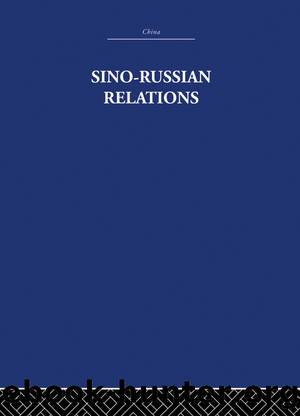Sino-Russian Relations by R.K.I. Quested

Author:R.K.I. Quested [Quested, R.K.I.]
Language: eng
Format: epub
ISBN: 9781136575327
Barnesnoble:
Publisher: Taylor & Francis
Published: 2014-02-25T00:00:00+00:00
10
1943â1950:
* * *
ORIGINS OF THE SINO-SOVIET ALLIANCE
The last really important battle of the Russo-German war took place in the Kursk-Orel section of the front in JulyâAugust 1943. After this the Germans were slowly pressed back, and the victory of the Soviet Union was obviously only a matter of time. The major aim of both Stalin and Roosevelt at that time was a foreign policy partnership between their two countries in the post-war world. Stalin clearly mistrusted Mao, over whose regime he had even less control than over Jiangâs, and plainly he hoped to play off the CCP and KMT, advancing Soviet interests in the borderlands and keeping China somewhat weak and divided but avoiding an all-out civil war. Roosevelt envisaged a China at peace under Jiang, but was much more afraid of the remaining Japanese war potential than Stalin appears to have been and ready to pay heavily for Soviet entry into the war with Japan. The Nationalist and Communist Chinese were long since embarked on a struggle to the death: efforts at compromise between them were merely tactical, for each knew that in the last resort a united China could only contain one of them. Jiang Kaishek opposed the Russians, looking for salvation to America, despite the existence of a weak pro-Soviet wing in the KMT, but the Chinese Communists tried to keep their foreign policy options as open as possible.
Stalin early tried to exact the highest price as a reward for his joining the war on Japan. At the First Cairo Conference in November 1943, Roosevelt extracted from Jiang an undertaking to bring the Chinese Communists into his government and promised a joint Nationalist-American occupation of Manchuria to keep the Soviet Union out. Yet within a few days, at the Teheran Conference of 27 Novemberâ2 December, Stalin had induced Roosevelt to promise him a warm-water port in Manchuria.
From mid-1943, partly as a result of the Xinjiang affair, the Soviet government gradually began to assume a somewhat more intimidating posture towards the Nationalists and in 1944 withdrew its military mission from Chongqing, although its ambassador continued there. As a corollary, Stalin began to make some small gestures of amity towards Yenan, but indicated to visiting Americans that he had no great respect for the Chinese Communists as Communists nor faith in their chances of winning in China. Mao for his part held unsuccessful talks with the Nationalists in May and June 1944, and thereafter welcomed a US military mission to Yenan. He made a genuine, bold bid for US support, signing a five-point agreement for a coalition government in China with the US representative Patrick Hurley in November 1944.
At the Yalta Conference of 4â11 February 1945, however, the failing Roosevelt conceded to Stalin in private that the Soviet Union should have South Sakhalin, the Kurile Islands, the status quo in Mongolia and control of the Manchurian ports and railways in return for coming into the war with Japan. Stalin now had a fresh inducement to keep on good terms
Download
This site does not store any files on its server. We only index and link to content provided by other sites. Please contact the content providers to delete copyright contents if any and email us, we'll remove relevant links or contents immediately.
| Africa | Americas |
| Arctic & Antarctica | Asia |
| Australia & Oceania | Europe |
| Middle East | Russia |
| United States | World |
| Ancient Civilizations | Military |
| Historical Study & Educational Resources |
Never by Ken Follett(2880)
The Man Who Died Twice by Richard Osman(2299)
Machine Learning at Scale with H2O by Gregory Keys | David Whiting(2291)
Fairy Tale by Stephen King(2069)
Will by Will Smith(2042)
Rationality by Steven Pinker(1765)
The Dawn of Everything: A New History of Humanity by David Graeber & David Wengrow(1571)
The Dark Hours by Michael Connelly(1570)
Principles for Dealing With the Changing World Order: Why Nations Succeed and Fail by Ray Dalio(1373)
Friends, Lovers, and the Big Terrible Thing by Matthew Perry(1327)
A Short History of War by Jeremy Black(1300)
HBR's 10 Must Reads 2022 by Harvard Business Review(1256)
Go Tell the Bees That I Am Gone by Diana Gabaldon(1234)
Can't Hurt Me: Master Your Mind and Defy the Odds - Clean Edition by David Goggins(1227)
515945210 by Unknown(1208)
Fear No Evil by James Patterson(1109)
443319537 by Unknown(1072)
Works by Richard Wright(1018)
Going There by Katie Couric(991)
